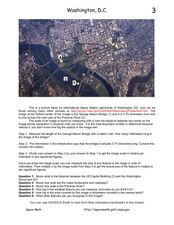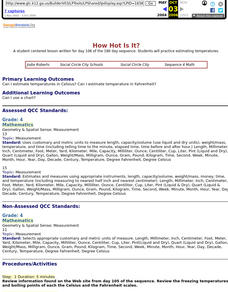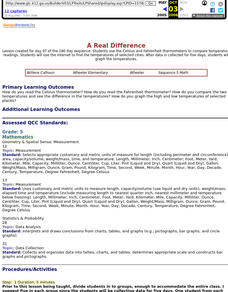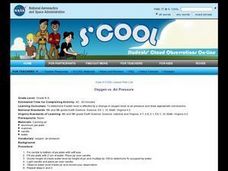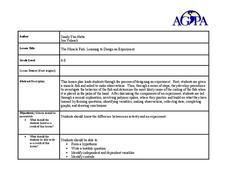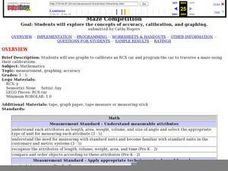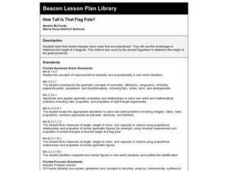Curated OER
Jupiter and Io
In this Jupiter and Io worksheet, students use a diagram of the planet and its moon to find the dimension of the image, the width of the largest feature in the atmosphere of Jupiter, the width of the smallest feature in the atmosphere of...
Curated OER
Washington D.C. from Space
In this Washington D.C. from space worksheet, students use a picture generated by the International Space Station and they find the scale of the image. They determine the actual size of features in the image, they find the distances...
Curated OER
Asteroid Eros
In this asteroid image worksheet, students observe a photograph taken by the NEAR imager and they determine the scale of the image following the given steps. They solve 4 problems using the scaled image and determine the dimensions, the...
Curated OER
Mars Rover Landing Site
In this Mars Rover Landing worksheet, students are given an image of Mars near the Bonneville Crater. Students determine the image scale in the diagram and use it to find the diameter of the Bonneville Crater, the width of the Rover's...
Curated OER
Comparing Countries
Students compare facts about different countries. In this comparing lesson, students collect information about the US and another country and compare them. Students locate countries on the map and make a hypothesis about the lives of...
Utah Education Network (UEN)
If the Shape Fits
Geometers juggle the idea of polygons. Using a game and manipulatives, they make trapezoids and irregular polygons. They review the algorithms for finding the areas of squares and rectangles. On day one, they find the area of trapezoids,...
Curated OER
How Hot Is It?
Fourth graders practice estimating temperatures. They practice in Celsius and Fahrenheit.
Curated OER
A Real Difference
Fifth graders use the Celsius and Fahrenheit thermometers to compare temperature readings. They use the Internet to find the temperatures of selected cities. After data is collected for five days, 5th graders graph the temperatures.
Curated OER
Take the Next Train To ...
Young scholars in a foreign language class are introduced to the vocabulary and basic concepts involved in reading and interpreting a train schedule. They then complete a comprehension/application quiz based on a train schedule from a...
Curated OER
Change It
Fourth graders expand their knowledge about how the physical properties of a substances can be changed. They are given multiple opportunities, using first-hand experiences and familiar objects in different contexts, to identify...
Curated OER
Critter? Growth
Learners identify and use the elements of the scientific inquiry to solve problems. They explain concepts about the structure and properties of matter. Pupils write an explanation of polymers and how the characteristic of polymers...
Curated OER
A World Of Matter
First graders complete a variety of experiments with solids, liquids and gases. They read books about matter, identify the characteristics of solids, liquids and gases and the sort and classify a variety of matter. Students make...
Curated OER
Waste Audit
Young scholars engage in a lesson that is concerned with the concept of mental math. They perform calculations as following: recognizing a half, three quarters, and tenths. Students are also challenged to extend skills to making...
Curated OER
Golden Ratio of the Human Body
Students calculate the ratio of the height of the body to the height of the navel. They discover that the ratios are all approximately equal.
Curated OER
Oxygen vs. Air Pressure
Students conduct an experiment to determine if water level is affected by a change in oxygen level or air pressure.
Curated OER
Partial Products
Third graders study partial-products algorithms. In this math lesson, 3rd graders use an algorithm to find the product of factors. Students discuss the relationships between multiplication and division.
Curated OER
Models and Algorithms to Solve Multiplication Problems
Students choose the correct strategy to solve multiplication and division. In this algorithm lesson, students use at least two strategies that use properties of operations and estimation. Students also recognize the relationship between...
Curated OER
PLANETS IN PROPORTION
Students discover scales for both the solar bodies' relative sizes and their distances from the sun. They find equatorial circumference and volumes of their solar bodies. Students apply estimation strategies and proportioanl reasoning to...
Curated OER
The Miracle Fish: Learning to Design an Experiment
Students develop procedures to explore the behavior of fish. In this scientific experiment lesson students from a hypothesis, write a question, identify different variables and controls in their experiment.
Curated OER
Car Maze competition
Students use graphs to calibrate an RCX car. They must then program the car to traverse a maze using their calibrations
Curated OER
How Can They Tell?
Pupils compare the characteristics of arcade tokens to those of a circulating U.S. quarter to determine how a video game can tell the difference between the two. They examine coins and arcade tokens very closely to observe the differences.
Curated OER
How Tall Is That Flag Pole?
Students examine various triangles and discuss how similar triangles have sides that are proportional. They utilize an ancient Egyptian method to determine the height of a flagpole.
Curated OER
Baseball Proportion
Students work on different mathematical skills that align with state standards. The skill of problem solving is done with reasoning and communication is made to students through solid brain connections to the math concepts.
Curated OER
Perimeter
Fifth graders create math word problems. In this geometry lesson plan, 5th graders define perimeter and discover how to find the perimeter of a rectangle, a square and a regular polygon. Students write word problems on finding the...



